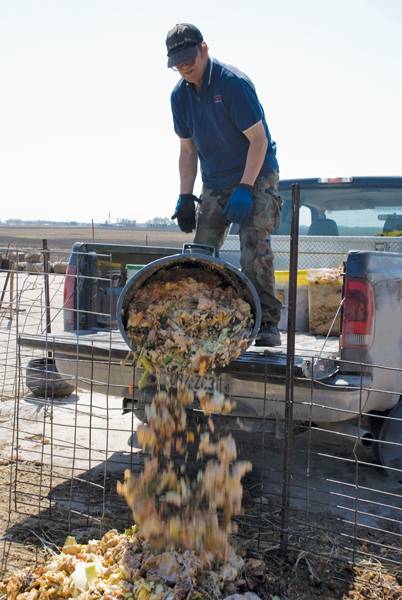Gateway Hotel goes green by helping local livestock ‘pig out’ on fine dining

“Wild” Bill with Black’s Heritage Farms pours a bucket of leftovers from the Gateway Hotel into an animal pen. The leftovers, which would otherwise be thrown away, are utilized to cut costs on feed purchases. Photo: Chris Potratz/Iowa State Daily
September 27, 2009
From guests and luncheons to weddings and conferences, the amount of leftover food generated by a hotel can really be a waste. But at the Gateway Hotel, 2100 Greenhills Drive, uneaten food is given to a group that doesn’t readily discern between gourmet and throwaway — pigs.
David Adler, director of food and beverage for the hotel, said that when he was hired in March 2008, he saw the potential waste as a possibility to help others.
“When I saw all the leftovers thrown into the dumpster, I had to ask myself what I could do,” Adler said.
By December, Adler had developed and implemented a partnership with Black’s Heritage Farm, 26156 530th Ave.
Adler named it the Slop Program — for obvious reasons and to ensure that there was no mistaking what was being sent.
The steps are pretty simple. The hotel has buckets that are used only for leftover food and beverages. When each plate or platter for an event or meal is taken to the back to be scraped into a trash can, the employees instead scrape the remainders into one of the designated buckets. When the buckets fill up, they are set aside and eventually taken to the pigs.
“I put the buckets into a van and run them down myself, or the farm comes by to get them,” Adler said. “It’s convenient for them since we’re on the way [to Ames], and it’s just a couple miles down the road from the hotel, so it’s easy for me.”
The round-trip time to load the food in a van, drive to the farm, drop off the slop and drive back takes about 15 minutes. Adler estimated the cost in gas to deliver the slop has been about $50.
But this is a drop in the bucket when compared to the benefit of keeping food from going to waste. Not to mention it has saved on the hotel’s trash bill — close to $1,000.
The farm is saving too. Its costs for feeding the pigs have dropped about 35 percent. Norine and Duane Black, owners of Black’s Heritage Farm, said they are happy to be part of a plan that saves on costs, but more importantly, is a step toward going green.
“It’s one step towards erasing our carbon footprint,” Norine said. “We’ve got to retrace and step backwards to help.”
And pigs aren’t the only ones benefiting from the hotel’s generosity. When events at the hotel make too much food, some of it doesn’t even leave the kitchen, Adler said. Food that hasn’t been served to customers, is untouched and is still nearly over-fresh is sent out to a homeless shelter in Ames.
What the pigs get is the leftovers— half-eaten items that can’t be given to the homeless because of food-safety regulations.
Still, the pigs aren’t complaining. Going from simple grains to filet mignon, buttery waffles, elaborate salads and desserts galore, they’re in hog heaven thanks to their 15,000 taste buds; humans have only 9,000.
“The pigs eat much better than I do,” Adler said.
He keeps careful track of how much food has gone out. When the program started, he estimated the hotel would give 30,000 pounds of food to the farm in the first year. As of now, it has provided about 20,000 pounds. That means Adler and the farm employees together have carried about 10 tons of food from the hotel. Over nearly a year, that’s a lot of lifting.
Gateway Hotel is the only place Adler knows of currently undertaking a program like this.
“It’s a small investment for a great impact,” Adler stated.






